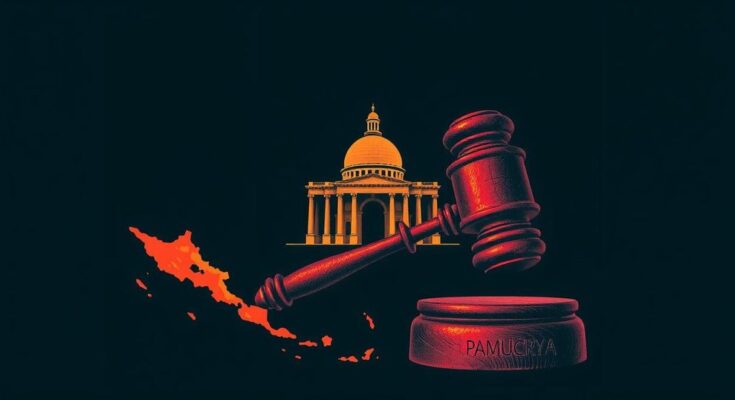The new Criminal Code in Indonesia poses significant threats to civil liberties, notably through provisions that criminalize dissent against government officials. Civil society, represented by KontraS, is alarmed by the regressive nature of the code, reminiscent of past authoritarian practices. Efforts to counter these changes have been largely ignored, prompting calls for international intervention to safeguard civic freedoms.
In a recent discussion with Fatia Maulidiyanti, Executive Coordinator of KontraS, serious concerns were raised regarding Indonesia’s newly passed Criminal Code. The legislation threatens to curtail civil liberties, echoing the oppressive climate of the Suharto era. Significant provisions within the code introduce severe penalties for defaming government officials and institutions, essentially silencing dissent and limiting civic engagement. Furthermore, the code imposes stringent requirements on public gatherings, further constraining civil society operations, which already face considerable challenges due to systemic corruption and flawed judicial practices. The overhaul of the Criminal Code is part of a broader strategy by the Indonesian government, which seeks to maintain power and control as the nation approaches the 2024 presidential election. Behind this initiative lies a series of ambiguous political negotiations that prioritize the interests of various political factions over fundamental human rights. Critics argue that the absence of civil society input in the code’s formulation signifies a troubling trend towards authoritarianism. Aspects relating to ‘morality,’ particularly laws criminalizing personal relationships, indicate a troubling shift aimed at appeasing conservative religious groups within Indonesian society. The implications for LGBTQI+ rights and personal freedoms are particularly dire, signifying the government’s reliance on regressive policies to consolidate support from fundamentalist factions. Civil society organizations have made persistent efforts to oppose these changes, utilizing protests and campaigns to voice their discontent. Despite these efforts, the government’s disregard for public dissent remains evident, as legislative processes continue unhindered by meaningful engagement with civic stakeholders. The international community plays a critical role in defending civil rights within Indonesia. It is imperative for global actors to advocate for the preservation of civic spaces, hold the government accountable, and challenge ongoing human rights violations. Concerted efforts from international partners, investors, and organizations are crucial to counterbalance the shrinking sphere of civic engagement in the country.
The topic at hand addresses recent legislative changes in Indonesia through the lens of civil society, particularly the implications of the new Criminal Code. Established in 1998, KontraS aims to investigate human rights abuses, particularly enforced disappearances and violence. The new code is seen as a significant setback for political freedoms and civil liberties, reinstating oppressive regulations reminiscent of the Suharto dictatorship, and poses a threat to the already beleaguered civil society landscape. Recognizing this context is vital for understanding the concerns articulated by civil society leaders like Fatia Maulidiyanti.
In summary, the recent amendments to Indonesia’s Criminal Code signal a concerning regression of civil liberties and human rights, reminiscent of past authoritarian governance. With provisions that criminalize political dissent and restrict civic outreach, the rights to assembly and expression are significantly endangered. As civil society leaders navigate these challenges, the necessity for international support becomes increasingly evident to ensure Indonesia’s adherence to human rights responsibilities and the maintenance of a vibrant civic space.
Original Source: www.civicus.org




